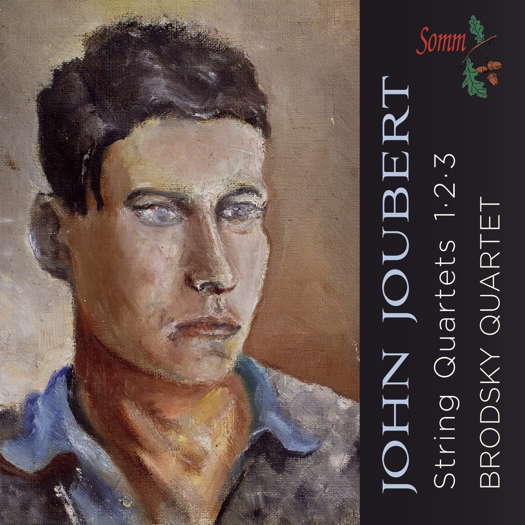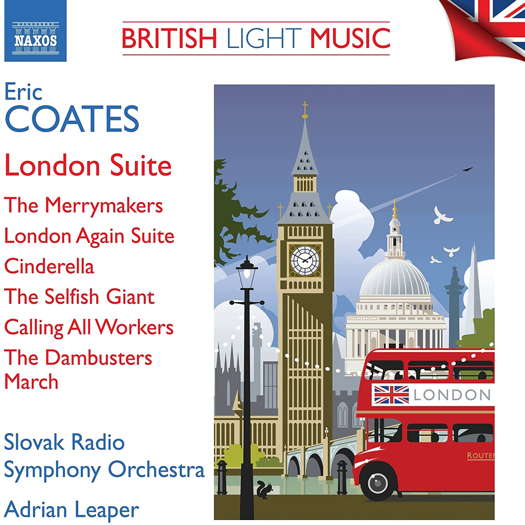 CENTRAL ENGLAND: Mike Wheeler's concert reviews from Nottingham and Derbyshire feature high profile artists on the UK circuit - often quite early on their tours.
CENTRAL ENGLAND: Mike Wheeler's concert reviews from Nottingham and Derbyshire feature high profile artists on the UK circuit - often quite early on their tours.
 SPONSORED: Ensemble. Melting Rhapsody - Malcolm Miller enjoys Jack Liebeck and Danny Driver's 'Hebrew Melody' recital, plus a recital by David Aaron Carpenter.
SPONSORED: Ensemble. Melting Rhapsody - Malcolm Miller enjoys Jack Liebeck and Danny Driver's 'Hebrew Melody' recital, plus a recital by David Aaron Carpenter.
All sponsored features >>
 SPONSORED: CD Spotlight. A Fascinating Recording - John Joubert's string quartets, heard by Alice McVeigh.
SPONSORED: CD Spotlight. A Fascinating Recording - John Joubert's string quartets, heard by Alice McVeigh.
All sponsored features >>

Immensely Soothing
GERALD FENECH listens to music by Eric Coates
'Adrian Leaper is an avid devotee of this genre, and he delivers performances that sparkle with a rhythmic immediacy that magnifies the flow of each piece.'
Eric Coates was born in Hucknall Torkard, Nottinghamshire, on 27 August 1886. His family was a musical one; indeed, his father was a capable amateur flautist and singer, and his mother was a fine pianist. Strangely enough, despite his wishes and obvious talent, his parents only reluctantly allowed him to pursue a musical career. Aged six, he took his first violin lessons with a local violin teacher, and later when thirteen he studied with George Ellenberger, who was once a pupil of Joseph Joachim. At Ellenberger's request Coates switched to the viola instead of the violin, supposedly for a single performance, but he found the deeper sound of the instrument much more to his liking, and he adopted the viola for the rest of his career.
In 1906 Coates was admitted to the Royal Academy of Music where he studied the viola with Lionel Tertis and composition with Frederick Corder. Coates made it clear to the latter that his wish was to write music in a light vein and not symphonies or oratorios. In 1908 Coates began to be troubled by pain in his left hand and numbness in his right, which were symptoms of the neuritis that affected him for the remaining eleven years of his career as a violist. Around this time he started to try his hand at composition, and his first pieces were favourably received, although one could detect influences by Sullivan and German.
In 1911 Coates met a RAM student, Phyllis Marguerite Black, an aspiring actress, and he soon fell in love. She reciprocated his affections, but her parents had doubts about how the man could provide for his future family. In the meantime his principal income came from his viola playing under such great conductors as Beecham, Mengelberg and Nikisch. He also played under the batons of several composers including Elgar, Delius, Holst, Richard Strauss and Debussy. Financially secure, he finally married Phyllis in February 1913.
Between the First and Second World Wars, Coates was very much in demand as a conductor of his own works, appearing in London and seaside resorts such as Bournemouth and Hastings, which then maintained substantial orchestras devoted to light music. But it was in the studio that he made the most important impact as a composer-conductor. Among those who bought his records was Elgar, who made it a point of buying all Coates' discs as they came out. Coates preferred the city to the country however, and he was more productive in his London flat in Baker Street. The views from there inspired him to compose one of his great hits, 'London Suite' (1933), with its depictions of Covent Garden, Westminster and Knightsbridge. Overnight Coates became a celebrity when the BBC chose the Knightsbridge March as the signature tune for the radio programme In Town Tonight, which ran from 1933 to 1960.
Listen — Eric Coates: Knightsbridge (London Suite)
(track 4, 0:00-0:56) ℗ 1993 Naxos Rights US Inc :
During the early part of the Second World War Coates composed little, until, on his wife's suggestion, he wrote the Calling All Workers March (1940) for the staff at the Red Cross Depot. This too was a big hit.
Listen — Eric Coates: Calling All Workers
(track 10, 0:00-0:51) ℗ 1993 Naxos Rights US Inc :
In 1954 Coates composed one of his last pieces, The Dambusters March for the film of the same name. The new piece was incorporated in the soundtrack to great success.
Listen — Eric Coates: The Dambusters March
(track 11, 0:00-0:59) ℗ 1993 Naxos Rights US Inc :
On 28 November 1957 Coates made one final appearance at a fund raising dinner for the Musicians Benevolent Fund. Three weeks later he suffered a stroke at his home, dying four days later on 21 December aged seventy-one.
This CD, apart from the pieces earmarked above, also includes The Merry Makers Miniature Overture (1923), The Selfish Giant (1925) and Cinderella (1929), the latter two both inspired by his son's bedtime stories and the Overture absorbing the jazzy dance rhythms of the day, plus another descriptive London visit in London Again Suite (1936).
Listen — Eric Coates: Cinderella
(track 5, 14:53-15:43) ℗ 1993 Naxos Rights US Inc :
This is music that is immensely soothing, lovely to listen to, and consistently light, melodious and engaging. Adrian Leaper is an avid devotee of this genre, and he delivers performances that sparkle with a rhythmic immediacy that magnifies the flow of each piece. Sound quality remains fresh, despite the 1992 recording published by the Marco Polo label the year after. A most welcome volume 3 in Naxos' reissued cycle dedicated to British light music.
Copyright © 28 November 2021
Gerald Fenech,
Gzira, Malta

CD INFORMATION - BRITISH LIGHT MUSIC: ERIC COATES
UNITED KINGDOM CLASSICAL MUSIC ARTICLES


